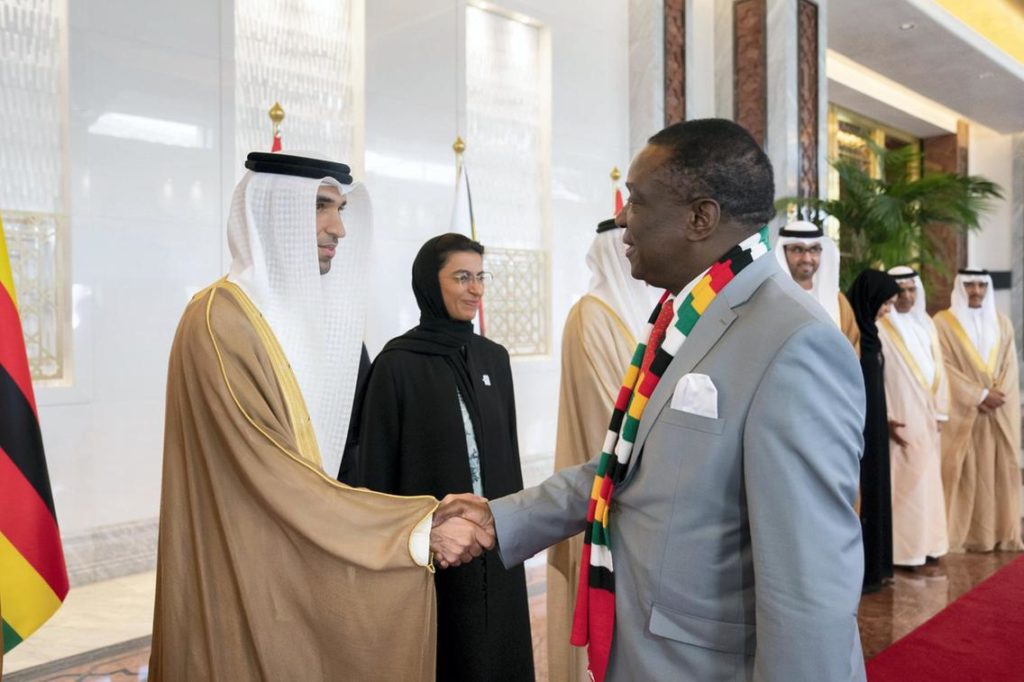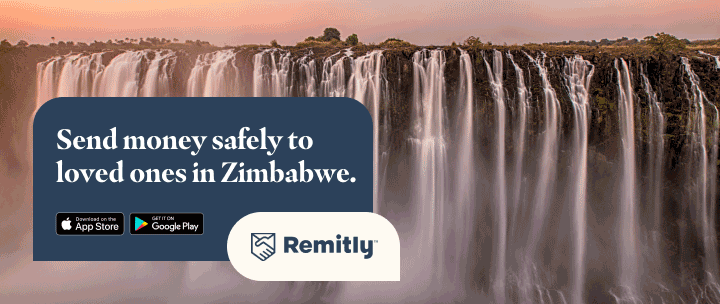
The United States should have lifted economic sanctions against Zimbabwe “yesterday”, President Mnangagwa has said, as he seeks to fix a broken economy and attract international investment.
“We feel that we are almost two decades behind in terms of development as a result of economic sanctions that have been imposed on us,” Emmerson Mnangagwa told The National in an interview in Abu Dhabi on Sunday.
“We are saying yes, we wish that these sanctions would be removed yesterday by those who have imposed sanctions on us, but beyond that we should not put our heads in the sand and cry,” he said. “We should, with the resources that we have, do our best to attract global finance into our economy.”
Surrounded by ministers and military officials who made up the visiting delegation, Mr Mnangagwa said that the country was putting two decades of isolation behind them and pursuing “a policy of engagement and reengagement so that again Zimbabwe can be embraced in the community of nations.”
But asked if the administration of US President Donald Trump had detailed the required reform it wants to see in order to lift sanctions, Mr Mnangagwa said the measures had “no basis at all” and that he would not take action to please another country simply to see them removed.
“We cannot say that there is something which we must do to satisfy America,” he said. “Our concern is to do those things which satisfy the needs of our people.”
US and EU sanctions were imposed on Zimbabwe in 2001 and 2002 respectively, in relation to reports of government violations of human rights and the rule of law. They have remained in place, despite Mr Mnangagwa’s ascension to the presidency in 2017 that ended the 30-year rule of Robert Mugabe. The measures were renewed by Mr Trump in January and the new Zimbabwean president himself is still a target of US sanctions.
But they are just one indicator of Zimbabwe’s economic malaise. Once known as the breadbasket of Africa and endowed with a young population and a bounty of platinum – used in the production of smartphones and electric cars – Zimbabwe’s fortunes faded during the three-decade rule of Mr Mugabe.
In November 2017, the military toppled the longstanding ruler and his deputy, Mr Mnangagwa, was named president to the backdrop of celebrations.
After elections, it fell to Mr Mnangagwa to chart a new course for Zimbabwe and convince the international investment community that things had changed. It was a considerable challenge, given his background as a Zanu-PF revolutionary and Mr Mugabe’s former bodyguard turned vice president.
Mr Mnangagwa was open about the challenges the country faces. While he says he is“very anxious to leapfrog” the country’s neighbours who have overtaken Zimbabwe during the Mugabe era, he said the country could not do it “on the basis of our domestic resources, we don’t have the financial muscle to fulfil our vision.”
Mr Mnangagwa impressed at the World Economic Forum at Davos in 2018 after promising to open up Zimbabwe’s economy, although he cancelled his trip this year when protests broke out in Zimbabwe.
During his first year in office, he has focused on tackling corruption, improving the business environment and reclaiming Zimbabwe’s lost billions. With an amnesty for stolen funds taken out of the country, he says he saw more than $825 million returned in just three months in 2018. “I believe that some is still out and we will continue to probe,” he said.
Mr Mnangagwa said there are still people coming forward quietly, wanting to declare assets abroad. He explained that the finance ministry was working out how to bring back the assets but they weren’t necessarily publicising every case.
“It has been difficult to fight corruption because it has entrenched itself,” Mr Mnangagwa said. “We don’t even know who we are talking to, are they the corrupt person or not, but we are fighting it.”
While the economic challenges are the gravest issue facing the country, Mr Mnangagwa’s vision for the country is more holistic. “We want to build a Zimbabwe we want, a Zimbabwe we can be proud of,” he said. “We should not condemn ourselves to poverty, condemn ourselves to isolation.”
Mr Mnangagwa spoke of the great need to give “hope” and “inspiration” to the younger generation.
But the dream of a new Zimbabwe was challenged in January when mass protests over a surge in the price of fuel drew violence from security forces and a military response.
Mr Mnangagwa said peaceful protest is allowed in Zimbabwe, but violence and destruction, such as the burning of police cars and damage to civil property is not. When that occurs, “the only people we can call in is the army to stop the destruction and bring law and order,” he said.
The Zimbabwean president said there had been “no crackdown on free speech,” in January and the response from the military had come from a lack of “machinery in terms of security to deal with demonstrations” after “two decades of isolation and sanctions”.
“If there is a political and economic jurisdiction in our region where free speech reigns freely and supreme, it is in Zimbabwe,” Mr Mnangagwa said.
He drew parallels with the so-called Yellow Vest protests sweeping France, a major challenge as President Emmanuel Macron nears the halfway point of his five-year term. “[The French police] use water cannons, and they use batons, but we don’t have those things,” he said. “We need to acquire them so that we can deal with civil disturbances.”
When asked if he has the full backing of his people and the Zanu-PF – which reportedly suffers from internal division – Mr Mnangagwa simply pointed to his election victory in July 2018, when won 50.8 per cent of the vote in a crowded field of 23 candidates.
Maintaining support among the majority of Zimbabweans – amid criticism from a vocal opposition, the Movement for Democratic Change – will likely require swift economic improvements.
And with investment from the US and Europe hard to come by, Mr Mnangagwa says he is happy to look elsewhere.
He said that economic relations were excellent with countries that had supported and armed Zimbabwe in its struggle for independence from Britain in 1980, namely Russia and China. Ties are strong too, he said, with Brazil and India.
On the legacy of Mr Mugabe, who for many embodied the corruption that was rife under his rule, Mr Mnangagwa insisted his government was prosecuting people from the top echelons of society to the very bottom. But on whether that would include his predecessor, Mr Mnangagwa said he would be treated like anybody else.
“We will not take charges against Robert Mugabe because he is Robert Mugabe… [but] If he has committed any crime he will not be spared.”
“The rule of law must apply to everybody in Zimbabwe.”
— The National



